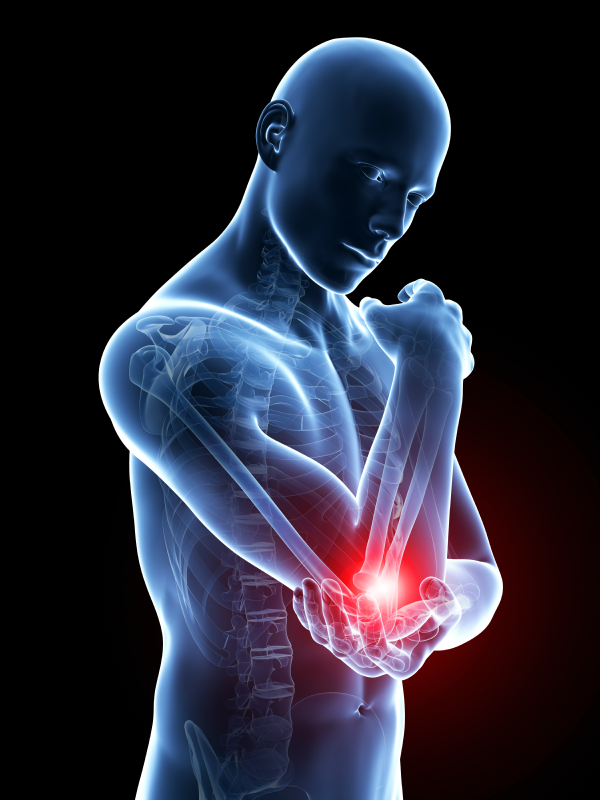
3d rendered medical illustration – painful elbowREPETITIVE STRAIN INJURY (RSI
Repetitive Strain Injury (RSI)
A general term to describe aches and pains in muscles, nerves and tendons from overuse and repetitive movements. It commonly affects the upper body; neck and shoulders, arms, elbows, wrists, hands and fingers. Often affects people working at computers, on an assembly line or gardening, carpentry, playing a musical instrument.
Symptoms: Pain, dull or sharp ache, tenderness, stiffness, throbbing, numbness or tingling, weakness, cramp. Initially symptoms may only occur when carrying out the repetitive action that causes them, though unless treated it may become constant over time even when resting.
Causes: Repetitive activities, carrying out a high intensity activity for a long time without rest, doing an activity involving force, such as lifting or carrying heavy objects, using vibrating equipment, poor posture or working in awkward positions. Stress and working in a cold environment are contributing factors.
Diagnosis: There is no specific test for RSI; your doctor will ask about your symptoms and medical history and examine you. Other underlying medical conditions may need to be ruled out such as bursitis, carpel tunnel syndrome, Dupuytrens contracture, epicondylitis, ganglion cyst, rotator cuff syndrome, tendonitis, tenosynovitis, trigger finger, Raynaud’s phenomenon, writer’s cramp; an X-ray can test for osteoarthritis and blood tests to rule out inflammatory joint disease.
Treatment: Short term use of anti-inflammatory pain medication (Ibuprofen) or pain receptor-blocking medication (some forms of anti-depressants) if symptoms are severe or interrupting sleep; cold packs, elastic supports, splints, physiotherapy, postural advice, stretching and strengthening exercises; steroid injections or surgery for specific conditions. Complementary therapies and relaxation techniques such as acupuncture, Alexander technique Pilates and yoga may be helpful though are not proven.
Prevention: Maintain good posture at work, playing music and other repetitive hobbies and tasks. Learn to sit at your computer correctly, making sure your seat, keyboard, mouse and screen cause you minimal strain. Take regular breaks from repetitive or long tasks, learn relaxation techniques if you are stressed, include a healthy form of exercise in your daily routine.
Osteopathic/Manual Management: Take a detailed case history to understand the nature of the problem and surrounding issues. Examine affected joint and all surrounding tissues; muscles, ligaments, nerves, fascia, etc., for movement, strength and functionality. Perform orthopaedic and neurological tests and determine the root cause. Examine the spine and assess nerve pathways to the affected joint. Treat to improve strength, functionality and movement and reduce tension, inflammation, pain and swelling. Specific taping or splinting may be required for stability and support. Postural and ergonomic advice as well as rehabilitation exercises. Treatment may include manipulation, deep soft tissue massage, trigger point therapy, muscle energy techniques, fascial techniques, dry needling, etc.
We are happy to advise you on your health matters and offer a free 15 minute joint and spinal check, without obligation.
 Lin Bridgeford DO KFRP MICAK MICRA FSCCO MSc
Lin Bridgeford DO KFRP MICAK MICRA FSCCO MSc
Registered Osteopath & Kinesiologist & Yoga Teacher
Aether Bios Clinic
Saltdean
Tel: 01273 309557
Mobile: 07710 227038
